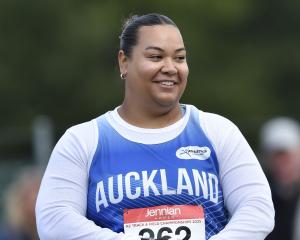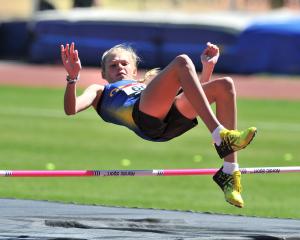
You could call Raylene Bates superwoman.
The Dunedin coach has always worn many hats when it comes to the world of athletics but they have afforded her opportunities she never takes for granted.
Bates is a high performance throwing coach and Athletics New Zealand para lead, and recently added another string to her bow as the Athletics New Zealand regional development manager for the South Island.
She also has a large workload as the chairwoman of the local Otago organising committee for the national track and field championships in Dunedin in March, and was recently elected as an Oceania representative for the world para athletics sport commission.
Throw in being the chef de mission for the New Zealand Paralympic team in Paris and you could say Bates has had a rather busy 2024.
Reflecting on being the chef de mission in Paris, Bates said it was a privilege to lead the team and a wonderful experience that came with a lot of hard work.
There had been many highlights, but being able to bring a little slice of home to their campaign abroad was near the top.
Support staff established a New Zealand team room where athletes could socialise, eat their meals and embrace the Games.
Bates, who has been involved in five Paralympic campaigns, recognised the Covid-affected Tokyo Games were difficult with athletes unable to interact with each other — many, including Bates, were unaware who some of their New Zealand team members were — and being able to bring them together in Paris was important.
‘‘Having that area this time that was so much like home . . . we had a lot of Kiwiana stuff,’’ Bates said.
‘‘That allowed those athletes to actually get to know each other, allowed them to sit around a TV, and cheer and yell at their team-mates that they hadn’t been able to do before.
‘‘To me, as chef, that was a huge pleasure being able to enable that because that’s what happens in an Olympic team.
‘‘Having been in two Olympic campaigns as well, I’ve experienced that, so I wanted to try and ensure that the Paralympic team had that opportunity as well.’’
New Zealand returned home with nine medals — one gold, four silver and four bronze — and Paris showed the growth in Paralympic sport.
‘‘We had four fourth placings and those placings would have been at least silver medals in the past Games.
‘‘The increase of performance across the whole board has gone twofold. It has absolutely accelerated at a speed that no-one’s probably predicted.’’
Athletes bounced back from forgetting prosthetics, Covid and pre-Games accidents to leave their best at the Paralympics.
The French responded, Bates said. They ‘‘put it on’’ and made the Olympics, and Paralympics, feel like one big campaign instead of separate events.
‘‘I think what the French did with utilising existing facilities, and using landmarks, and making the Olympics, and Paralympics, accessible to the public, it just lifted it up another step.
‘‘Walking down the Champs-Elysees for the opening ceremony, I was so emotional because you would have thought there was 50,000 Kiwis standing there.
‘‘It was unbelievable. They just embraced it.’’
Athletics has long been Bates’ wheelhouse, and seeing how many people packed out Stade de France was mind-blowing.
‘‘You couldn’t hear yourself think.
‘‘To have between 60 and 80 thousand people in the stadium was amazing.
Watching Dunedin athletes Holly Robinson — Bates has been her longtime coach — and Anna Grimaldi reach the podium was special.
‘‘I just feel that I’m incredibly lucky to have been part of that,’’ Bates said.
‘‘Even sometimes, if it’s not right in the heat of it . . . but you do get emotional, you feel the celebrations and you feel the heartbreak at the same time, just like they do in a different way.
‘‘You’ve got a huge sense of pride.’’
Watching the Dunedin duo embrace their community made Bates proud, and she knew the benefits the two-way support had.
‘‘One thing that I think we have here in Otago, that is potentially different to a lot of the rest of the country, is we do instil in our Otago athletes the pride of the province and connection of our whanau.
‘‘I call it our athletics whanau because that’s not just the coaches, or officials — that’s just anybody that has a passion, anybody that supports.
‘‘But we also try to instil the values of you give back . . . and with that the community feel like they’re part of their campaigns, part of their journey as well.
‘‘It’s a win-win situation. I’m pretty sure that most of Dunedin feel like they own these girls.’’
Some para athletes questioned why they were not included regularly in the Diamond League.
Some events are included, and there had certainly been growth, and more discussions around additional opportunities for para athletes.
Fully integrated para events were first introduced at the 2010 Commonwealth Games and were a step in the right direction, Bates said.
But with so many classifications, and various events, under the para athletics umbrella, it made it hard.
‘‘The biggest issue is simply . . . how do you choose which event, or classification, would actually be [included] without undue prejudice against others.
‘‘I don’t know what the answer to that is.’’
Paralympics provided great opportunities for athletes but also for support staff, and Bates never took for granted the chance to lead New Zealand in Paris.
Chef de mission is a voluntary role, compared to the New Zealand Olympic Committee role, and it was untenable for someone to lead and also coach.
Robinson was Bates’ sole athlete in Paris, but if Bates had additional athletes competing in 2028 — ‘‘and hopefully I will’’ — she would be unable to be chef de mission.
‘‘Look, I relished the opportunity of being chef, and I feel extremely privileged to have done it, but first and foremost I am a coach.’’
Days after returning to New Zealand, Bates began her new role as regional development manager for the South Island.
A restructure at Athletics New Zealand to introduce new regional roles led to Bates’ involvement, helping support various athletics centres throughout Otago, Canterbury, Southland and Tasman and providing a link to the national organisation.
Off the back of the Paralympics, Athletics New Zealand facilitated para athletics have-a-go days throughout the country, celebrating Paris and trying to find the next crop of talent.
‘‘That’s been highly successful.’’
Bates is also deep in preparations for the national track and field championships in Dunedin in March.
The event will feature under-16, under-18, under-20 and senior age groups — plus para athletics — at the Caledonian.
‘‘That’s the first time Dunedin has hosted four days of nationals and four age groups, because it’s quite new.
‘‘It’ll be awesome.’’
The local organising committee had been working hard behind the scenes with the Dunedin City Council, Otago Polytechnic and Sport Otago.
Polytechnic students were upskilling to become officials for the events, and others will volunteer, and the council had been helping get the Caledonian ‘‘up to scratch’’ for an international event.
Many of New Zealand’s big names are tipped to attend the championships — ‘‘there will be more here than not’’ — and some international athletes will also compete.
Organisers are hoping to host ‘‘feature windows’’ where the community can see top athletes together and engage with them more.
‘‘We’re looking at a few new initiatives and just trying to let the city see these guys in person.’’
About 130 officials were registered already and organisers were always on the look out for more volunteers to help facilitate the championships.













